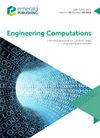基于迭代局部搜索的混合模型装配线混合负荷零件进料调度优化混沌差分进化算法
IF 1.5
4区 工程技术
Q3 COMPUTER SCIENCE, INTERDISCIPLINARY APPLICATIONS
引用次数: 0
摘要
在可持续生产的驱动下,移动机器人作为一种新的清洁能源材料处理工具被引入混合模型装配线(MMALs),它减少了能源消耗和工作站(LSI)的生产线库存。然而,之前的零件进料调度方法是针对传统的物料搬运工具设计的,没有考虑机器人移动配送系统(RMFS)的灵活空间布局。为了填补这一空白,本文重点研究了考虑准时制(JIT)的绿色移动机器人零件进料调度问题,其中吊舱的布局和数量是可以调整的。设计/方法/方法提出了一种新型混合装载吊舱(HL-pod)和移动机器人,用于执行物料超市和装配线之间的零件馈送任务。制定了一个双目标混合整数规划模型,以最小化总能耗和LSI,与环境和可持续的JIT目标保持一致。针对该问题的NP-hard特性,提出了一种基于迭代局部搜索(CDEMIL)算法的混沌微分进化多目标优化算法。通过在不同问题尺度下处理基于hl -pod的绿化零件进料调度问题,验证了所提算法的有效性,并与两种基准算法进行了比较。进行管理见解分析,以实施HL-pod战略。CDEMIL算法对不同问题尺度产生帕累托前沿的能力证实了其有效性和可行性。计算结果表明,该算法在求解质量和收敛速度方面优于其他两种算法。此外,结果表明,HL-pod比采用单一类型的pod性能更好。本研究提出了一种基于RMFS和HL-pods的汽车mmm中高效零件投料调度问题的创新解决方案。它考虑了豆荚的布局和数量,确保了可持续和环保的生产方式。本文章由计算机程序翻译,如有差异,请以英文原文为准。
Iterated-local-search-based chaotic differential evolution algorithm for hybrid-load part feeding scheduling optimization in mixed-model assembly lines
Purpose Driven by sustainable production, mobile robots are introduced as a new clean-energy material handling tool for mixed-model assembly lines (MMALs), which reduces energy consumption and lineside inventory of workstations (LSI). Nevertheless, the previous part feeding scheduling method was designed for conventional material handling tools without considering the flexible spatial layout of the robotic mobile fulfillment system (RMFS). To fill this gap, this paper focuses on a greening mobile robot part feeding scheduling problem with Just-In-Time (JIT) considerations, where the layout and number of pods can be adjusted. Design/methodology/approach A novel hybrid-load pod (HL-pod) and mobile robot are proposed to carry out part feeding tasks between material supermarkets and assembly lines. A bi-objective mixed-integer programming model is formulated to minimize both total energy consumption and LSI, aligning with environmental and sustainable JIT goals. Due to the NP-hard nature of the proposed problem, a chaotic differential evolution algorithm for multi-objective optimization based on iterated local search (CDEMIL) algorithm is presented. The effectiveness of the proposed algorithm is verified by dealing with the HL-pod-based greening part feeding scheduling problem in different problem scales and compared to two benchmark algorithms. Managerial insights analyses are conducted to implement the HL-pod strategy. Findings The CDEMIL algorithm's ability to produce Pareto fronts for different problem scales confirms its effectiveness and feasibility. Computational results show that the proposed algorithm outperforms the other two compared algorithms regarding solution quality and convergence speed. Additionally, the results indicate that the HL-pod performs better than adopting a single type of pod. Originality/value This study proposes an innovative solution to the scheduling problem for efficient JIT part feeding using RMFS and HL-pods in automobile MMALs. It considers both the layout and number of pods, ensuring a sustainable and environmental-friendly approach to production.
求助全文
通过发布文献求助,成功后即可免费获取论文全文。
去求助
来源期刊

Engineering Computations
工程技术-工程:综合
CiteScore
3.40
自引率
6.20%
发文量
61
审稿时长
5 months
期刊介绍:
The journal presents its readers with broad coverage across all branches of engineering and science of the latest development and application of new solution algorithms, innovative numerical methods and/or solution techniques directed at the utilization of computational methods in engineering analysis, engineering design and practice.
For more information visit: http://www.emeraldgrouppublishing.com/ec.htm
 求助内容:
求助内容: 应助结果提醒方式:
应助结果提醒方式:


